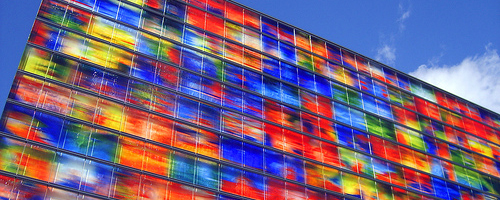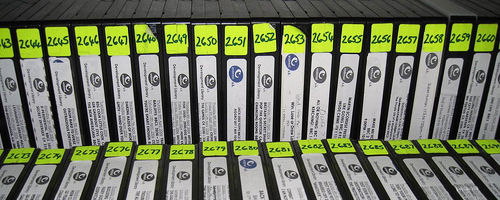As I may have mentioned before, I’m working in the broadcasting industry at the moment. The broadcasting industry is changing. Everybody tries to get rid of those good old tapes and do everything with digital files. But why? I know this sounds like a funny question. But when you think about it, it’s a bit puzzling. Why do computer files appear so much more appealing than videocassettes? We may immediately think of reduced costs, efficiencies, platform convergence and other ready-at-hand business phrases. Ultimately, however, we should look at the people in and around broadcasting and how they chat amongst each other. Continue reading
Nothing happening
Sadly, I've recently neglected my blog. I'm hoping to write some posts again in the future. In the meantime, I'm sending out thoughts and ideas via twitter (@herrhorn).Followe me on Twitter
Tweets by herrhornTags
24 advertising Apollo 11 Archbishop art exhibition Banksy Berlin Blue Rain Bristol broadband broadcasting Bruno Chris Anderson communication power conferences Copyright digital divides e-learning education exams Facebook films Free Germany Google Google News higher education history of technology Hollywood Identity ideology internet access Iran ISPs Jack Bauer journalism London LSE LSE library Manuel Castells mars Marshall McLuhan mass self-communication Mauritius media events Media Power moon landing movies museums News Corp. newspapers online collaboration online study groups Oxford phone booths privacy public art Public Discourse Public Service reputation management Sacha Baron Cohen scarcity/abundance space travel Starbucks stardom/fandom Technology terrorism The Long Tail TV shows Twitter urban life user interfaces Virtual Communities Wired YoutubeRecent Comments
- Selfies and Mass Communication – Visual Culture in CEID100 on Manuel Castells at LSE – Mass Self-Communication
- Emerson on Manuel Castells at LSE – Mass Self-Communication
- Monika Bauer on When Jack Bauer is using a computer…
- klicken on Privacy and innovation – two parts of the same story
- hay day gift cards on Privacy and innovation – two parts of the same story
-
Recent Posts
- ICTs and urban life
- “My name is ___, and I’m leaving Facebook.”
- The promises and obstacles of process journalism
- Peaceful co-existence – Social networks and niche communities
- Metropolis – 83 years later and we’re still afraid of machines
- Privacy and innovation – two parts of the same story
- Extremely Green and Incredibly Remote
- Some time off
- German stereotypes – A beer glass full of precision
- Can Google Wave revitalize online debates?
Archive
- February 2011 (1)
- July 2010 (1)
- June 2010 (1)
- March 2010 (1)
- February 2010 (2)
- January 2010 (1)
- November 2009 (7)
- October 2009 (8)
- September 2009 (9)
- August 2009 (10)
- July 2009 (10)
- June 2009 (3)
Content License

herrhorn.com by Sebastian Horn is licensed under a Creative Commons Attribution 2.0 UK: England & Wales License.


